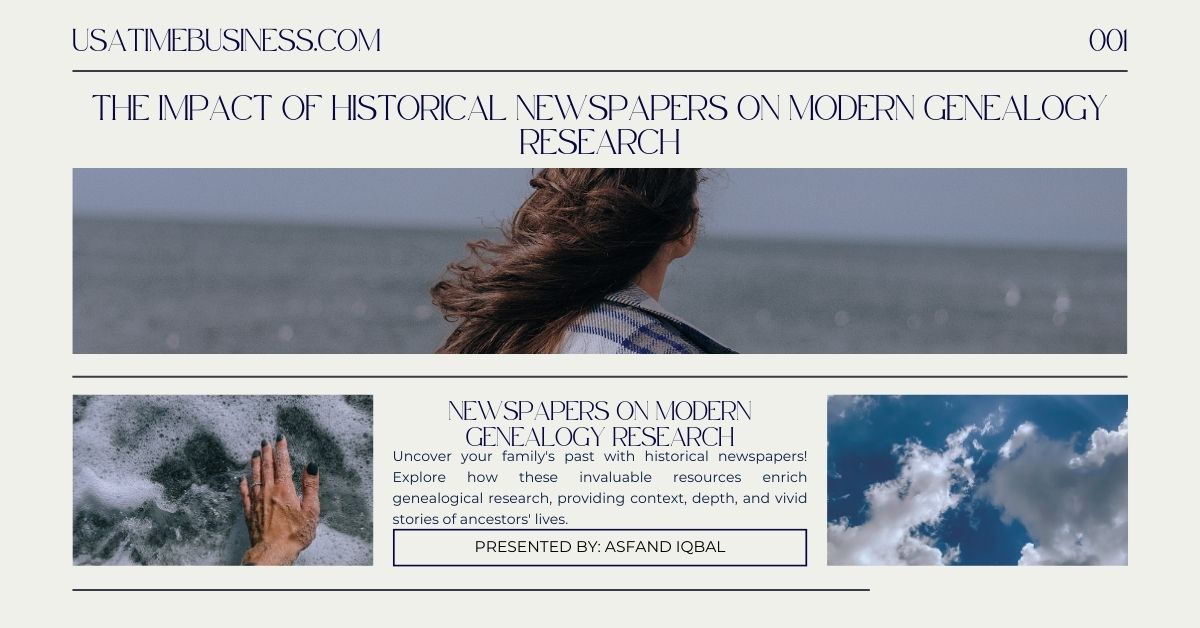Key Takeaways:
- Historical newspapers are invaluable resources for genealogical research, providing context and depth to family stories.
- Digital archives have greatly enhanced access to old newspaper articles.
- Understanding the social history of the times gives a richer perspective when piecing together your genealogical puzzle.
- Technological advancements are poised to revolutionize genealogical research.
Contents
- 1 Introduction to Historical Newspapers and Genealogy
- 2 Leveraging Historical Records for Genealogical Breakthroughs
- 3 The Evolution of Genealogy from Past to Present
- 4 Exploring the Significance of Social History in Genealogy
- 5 Research Techniques for Exploring Old Newspapers
- 6 Analyzing Ethical Considerations in Historical Research
- 7 Preserving Personal Histories Through Newspaper Archives
- 8 The Future of Newspapers in Genealogy Research
- 9 Case Study: The Integration of Newspapers into Family Tree Building
- 10 Conclusion: Continuing the Quest for Ancestral Knowledge
Introduction to Historical Newspapers and Genealogy
In the quest to uncover our roots, the troves of archived historical newspapers stand as silent testimonies of the past, their pages rich with the daily occurrences that shaped the lives of our ancestors. By incorporating detailed accounts from old newspaper articles into our research, genealogists can unearth a treasure of information that official documents alone cannot provide. These newspapers capture the essence of the times, offering broad narratives of significant historical events and the intimate minutiae of everyday life.
While birth certificates, marriage licenses, and death records are core elements of genealogical research, newspapers provide the cultural context surrounding these critical moments. They preserve the voices of communities and individuals, from small-town gossip columns to city-wide declarations, all weaving a rich mosaic of history. The significance of these papers extends beyond mere data collection—it is about engaging with the past and preserving society’s collective memory for future generations to cherish and learn from.
Leveraging Historical Records for Genealogical Breakthroughs
The potential to achieve breakthroughs in genealogy using historical newspapers is immeasurable. Countless success stories stem from the dusty pages of archived editions, where obituaries, marriage announcements, advertisements, court records, and community news paint detailed portraits of our forebears. The information from these sources often provides the missing links that genealogists long for, offering new avenues to explore in the labyrinth of family history.
Expert genealogists extol the triumphs of sifting through the past, recounting how a single column inch in an old paper verified a lineage or uncovered a long-lost relative. Developing a strategy to navigate through extensive collections is akin to a historian crafting a lens through which the past can be viewed. It is an intricate dance of knowing where to look, what to look for, and how to interpret the findings within the broader narrative of history. These pieces of information collectively act as a foundation upon which lineage structures are built, and family trees grow tall.
The Evolution of Genealogy from Past to Present
The landscape of genealogy has evolved dramatically over the years, transitioning from an era dominated by painstaking searches through physical archives to one where digital databases are at the forefront. The acceleration of archiving technologies has ushered in a new age for genealogists, removing previous limitations and empowering them to dive into family history regardless of location.
The digitization of records speeds up the research process and breaks down the barriers that once made genealogy the purview of specialized historians. Today, amateurs and professionals can trace their lineage online, accessing vast information networks and connecting dots across continents and centuries. The impact of this transformation is not to be understated, as it has profoundly democratized the pursuit of ancestral knowledge and provided a plethora of tools for understanding our origins.
Exploring the Significance of Social History in Genealogy
One must recognize the role of social history when diving into genealogy. Historical newspapers are often the most vivid snapshots of society’s past, depicting everything from the monumental headliner events that shaped public consciousness to the modest local chronicles that silently dictated the rhythm of everyday life. Obituaries elegantly summarize lifetimes, and wedding announcements joyously herald new beginnings; these entries are more than mere records. They are the stories of our ancestors, telling us not just when and where they lived but how they lived, loved, celebrated, and mourned.
Advertisements in old journals reveal prevalent trades and crafts of the era, while opinion pieces and editorials reflect the views and values that prevailed. Local news and events, whether about crop harvests or social gatherings, provide context to the environments our ancestors navigated. Each small discovery adds a layer to the understanding of our familial past, granting insights into the social norms, economic conditions, and cultural milieus that influenced their decisions and defined their lives.
Research Techniques for Exploring Old Newspapers
Mastery of specific research techniques is essential when delving into historical newspapers. Genealogists must become adept in keyword searches, familiar with the terminology of the era, and resilient when faced with the challenges of antiquated language or cursive scripts. Developing a systematic approach to browsing archives can reveal a wealth of information otherwise hidden in plain sight.
Notably, online portals offer genealogists a chance to explore extensive digital collections of historical newspapers. This resource is invaluable for tracing lineages and enriching family narratives with reported stories, personal announcements, and the significant events of the time.
Analyzing Ethical Considerations in Historical Research
Every journey through historical records must consider ethical implications. Genealogy is a pursuit deeply imbued with personal significance. Still, it must also be approached with respect and discretion: privacy, marginalized groups’ representation, and sensitive material handling demand careful thought and ethical stewardship.
Researchers must navigate the delicate balance between the right to know one’s ancestry and the potential impact of revealing family secrets or uncomfortable truths. Guidance from reputable organizations can help ensure that genealogists maintain integrity and sensitivity as they unearth and present historical narratives.
Preserving Personal Histories Through Newspaper Archives
Newspapers have long served as vessels for preserving personal histories. These archives hold immeasurable value for individuals seeking to understand their place within the grand tapestry of history. The vivid snapshots of life in these printed pages are an endless source of knowledge, offering unique insights into our heritage.
Recording and preserving individual narratives is a collaborative effort involving genealogists, archivists, and historical societies. This essential partnership maintains the integrity of the records and ensures their survival for future generations to discover and appreciate. The legacies encapsulated in yellowing newspaper sheets are thus given new life, safeguarded against the erosive passage of time.
The Future of Newspapers in Genealogy Research
The future of genealogical research suggests an even greater integration of advanced technological tools. Efforts continue to bring more historical newspapers online, while artificial intelligence and machine learning innovations are on the brink of transforming how we interact with and interpret data. In pursuing family histories, these advancements promise to expedite information processing and open unprecedented possibilities for connection and understanding.
The rise of interconnected digital resources is changing the nature of genealogical work, enabling researchers to construct more comprehensive and accurate family histories. As we look ahead, it is clear that newspapers will continue to be a significant tool for genealogists, enriched by the enhanced access and analytical capabilities provided through technology.
Case Study: The Integration of Newspapers into Family Tree Building
The addition of newspapers to the genealogy toolkit has been revolutionary, offering myriad ways to validate and enrich family narratives. Case studies of their use reveal a deeper level of storytelling, where ancestors are no longer abstract names in a database but real people who lived through actual events. Historical newspapers enable genealogists to provide context and color to the skeletal branches of their family trees, producing a more vivid and comprehensive family history.
Anecdotal evidence shows the power of a single piece of newsprint to corroborate, extend, or sometimes even dispute family stories. From finding a mention of a great-grandparent in a small-town article to tracing a direct lineage through published obituaries, newspapers can be the key to unlocking long-standing mysteries within family histories.
Conclusion: Continuing the Quest for Ancestral Knowledge
The search for our ancestral origins is a task of both heart and history. As we connect the dots of lineage and legacy, historical newspapers remain essential to the genealogist’s repertoire. Their ability to provide context, depth, and texture to our family stories enriches the search for our roots, making the past accessible and relatable.
As more individuals embark on this personal voyage of discovery, they contribute to the collective endeavor of genealogy and join a passionate community that values preserving history. With technological strides continuing to enhance access to historical records, the journey into our past is ever more enthralling, promising to yield discoveries and connections that span the breadth of time and the expanse of human experience.
Good luck, Habibi!
Come to the website and explore some mind-blowing content.
- Why Every Fashionista Needs a pork pie hat in Their Wardrobe

- Ultimate Guide to Shopping for parachute pants: Where to Buy, What to Look For

- Exploring the Delicate Flavors of tagliolini Pasta: A Culinary Journey

- Uncovering the Truth Behind blog del narco: A Deep Dive into Mexico’s Drug War

- Exploring the History and Tradition of cempasuchil in Day of the Dead Celebrations

- The Ultimate Guide to boquerones: How to Prepare and Enjoy these Spanish Delicacies






